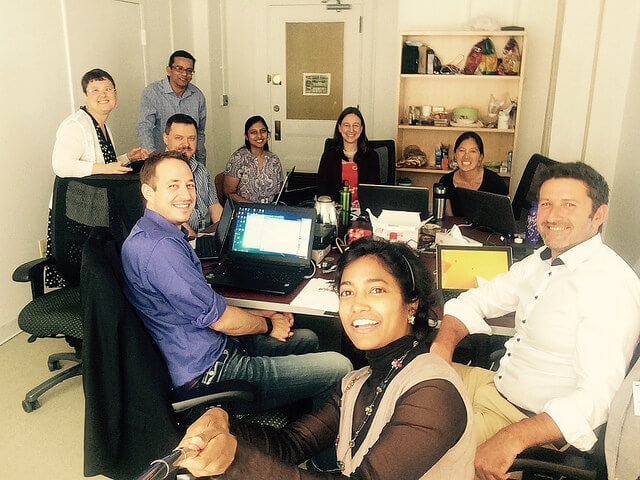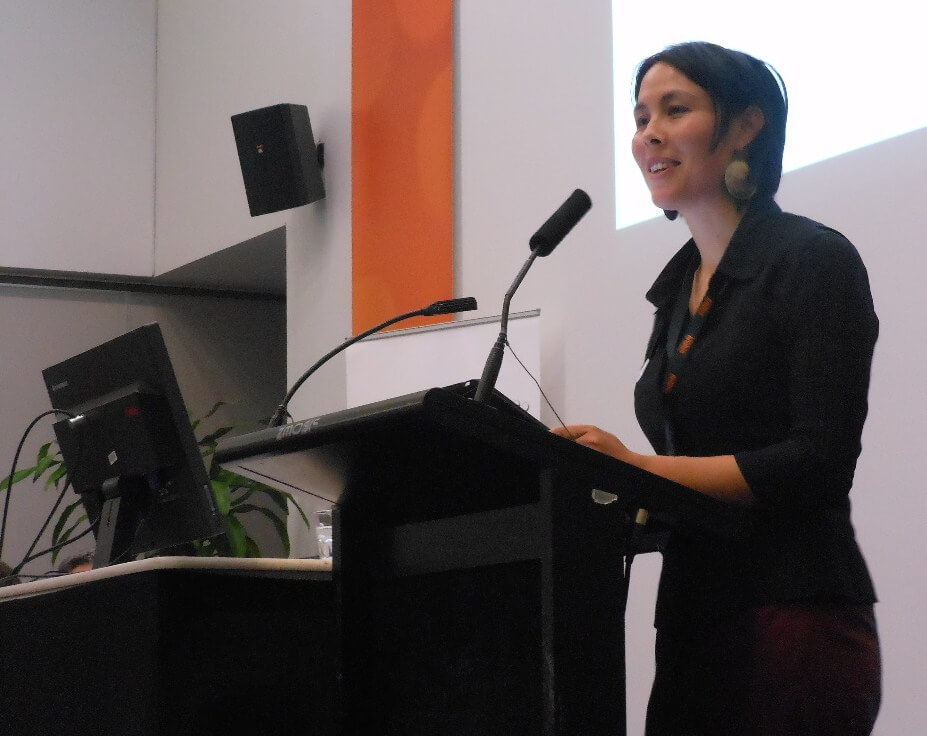I attended the AngleBrackets/DevIntersection tech conference in Las Vegas this week (as I did earlier this year). It was a fantastic experience as always, and I highly recommend that developers of all skills and ages attend conferences, even if they aren't the big national ones.
More than once, I was enthralled by the ease with which the speakers at this conference would stand on stage in front of packed halls and not run screaming from the terrifying unknown masses. This is something I've wanted to do for quite a while, speak in front of people, and I suddenly decided that I needed to know why they did it. I had my own ideas, of course, but to me it was more fulfilling to hear what they thought of speaking and why they kept doing it. So, for four days, I tracked down as many speakers as I could find and asked them three simple questions about being a presenter at tech conferences. Their answers were surprisingly diverse, but each had threads of commonality. Let's see if we can peer into the mind of the tech conference speaker and find out what drives them.
The Three Questions
For each person I interviewed at DevIntersections, I asked them three questions:
- Who are you, and what do you do?
- Why do you personally present at conferences such as this one?
- How can someone like me, a regular developer, work toward becoming a presenter at conferences?
I only informed the person I was interviewing of the first question, and they did not hear the other two questions until we were recording, so all the answers you will hear below are off-the-cuff. I recorded all of their responses, each of which is listed below, and excerpts from those responses are also posted. You can listen to all of the interviews over on SoundCloud.
The answers to the third question are a whole different conversation, and I'll explore them in a later post. For now I want to focus on the responses to the second question. Let's see if we can discover what compels speakers to spend time and energy presenting at conferences.
Interacting with the Community
A good conference is not about the sessions; it's about the people, about connecting with people who think similarly to (though not the same as) you. Some of the speakers that I interviewed told me that they presented at conferences because it enables them to interact with the greater tech community:
Dan Wahlin (consultant, author, founder of Wahlin Consulting): "It's really fun to hear about what everybody else is doing. I'd love to say that you can sit behind your walled garden and understand the pulse of the tech community, but if you don't get out and talk to people, you don't hear about some of these things. At conferences, you meet so many people and hear about so many issues. You learn more."
Anthony van der Hoorn (co-founder of Glimpse): "I think it's a good way of sharing knowledge and connecting with the community, and figuring out where the community is at, and what they are interested in, and trying to share cool and interesting things that are happening. It's a really good way of being engaged."
For some people, the atmosphere was the best part about being a speaker:
Ward Bell (VP of Technology, IdeaBlade): "I love the vibe. I love being with people that are trying to learn things. I like learning things, and I see many of my friends here who are swapping information as well as jokes and good times. It's a great time to get together and ask real questions and get real answers from people face-to-face."
Exposure
Of course, one of the benefits of being a conference speaker is that it gets your name out there. Many of the presenters told me that the exposure generated from speaking at conferences is a big reason for speaking at them.
Steve Smith (Consultant, CTO for Falafel Software): "One [reason] is that it helps get my name out there and helps get business for me or my employer. I currently work for Falafel Software, so me being here helps [them]. When they are trying to win clients, they can say 'our employees are speakers at industry events.' The biggest [reason] is the visibility that it offers."
Troy Hunt (security writer, creator of HaveIBeenPwned): "I started presenting four or five years ago, and for me I found that it was a really good way to get exposure to people, to learn a lot more about what I'm talking about. You're forced to know what you are talking about once you've actually got to stand in front of people. If you get it wrong, you feel silly. It's like a forced education. You learn stuff so much better when you've got to explain it to people.
"Now that I'm an independent, the exposure helps me get people to watch my Pluralsight courses and [attend my] workshops."
Some speakers stated that while doing presentations is good for exposure, that's not the only reason they speak:
Billy Hollis (UX and front-end consultant, author): "Because I love it. Certainly it's effective as a form of marketing. If someone sees you as the expert in something, and you make a good case that you understand a particular technology or area of the industry, it's pretty easy to convince them to use your services. But, honestly, I would [speak at conferences] without that. I've been speaking since I was very young, and getting up on that stage gives me a charge."
Juval Lowy (software architect, author, founder of IDesign): "Because I want to make a difference. I don't do it for the recognition; I already have enough of that. I don't do it for the money; I can make much more money working with customers than spending my time doing this. I've done very well for myself over the years, so I don't need to travel anymore. I only do it because I want to make a difference.
"Imagine I knew all the things that I know, and I wouldn't tell anybody. I'd go nuts. [You can] think of it as my form of therapy."
NOTE: This is the only recording where I forgot to have the interviewee introduce himself.
Sometimes, conducting a presentation actually provides useful feedback to a development team:
Jay Schmelzer (Director of Program Management for .NET at Microsoft): "There are a couple aspects to it. Part of my job is to go out and evangelize and talk about the products we're working on.
"The other part of it is, I get a lot of enjoyment out of it. I enjoy the opportunity to interact. Even when the room is quiet, or people aren't asking specific questions, I can read the room and get a feel for [if] the way we're talking about it is making sense to them, resonating. Are they excited about it because they are sitting up in their chair? I can bring those kinds of things back to the team, to the design process, to help us build a better product."
Teaching Others
One of the most common responses I got from these speakers was that they just love to teach. Some of them wanted to share ideas, to put minds together and work out the tough problems:
Kathleen Dollard (.NET Coach and Director of Engineering for Real): "Because I love it is the short answer. It gives me an opportunity to connect with people.
"I love to teach, I love to put ideas together (sometimes successfully, sometimes less successfully). It's a challenge, and it gets information out there that I'm passionate about getting out there."
Javier Lozano (Owner of LozanoTek): "I like to share knowledge, and I love to see people learn. Coming to these conferences allows me to tap into different audiences and [be] able to share my experiences with them and learn from their experiences, and see how we can come together [to] solve intricate problems."
Some simply wanted to spare others the frustration that they themselves encountered:
Robert Green (Technical Evangelist at Microsoft): "The thing that I've always loved more than anything else was learning things and then sharing that knowledge with others. When I learn something, I think, 'you know, there must be people like me who are in the same boat.' So if I can come to a conference, and I can do a talk, and in 75 minutes teach you what I've already learned, then I can save you that time and get you to the point where you say 'oh, is that all that is? I can do that.'"
The "A-Ha!" Moment
Some presenters, in addition to wanting to spare others from frustration, live to see the moment when people "get it":
Scott Hanselman (Community Manager for ASP.NET and Azure Web Tools at Microsoft): "I was an adjunct professor at a state college for a while, so I think that I'm a teacher above all. It would be hard [for me] to decide if I am a teacher or a programmer. I've been teaching for 25 years, and I enjoy it.
"Presentations at conferences, the way that I do them, are just teaching on a large scale. I like it when a person lights up, and I figure out that that young man or that young woman just got what I was saying. They got it."
Brent Ozar (SQL expert and owner of Brent Ozar Unlimited): "To see the "a-ha!" look when people get a concept. I want to take the hardest concepts I can find and boil them down into the simplest possible ways. Anybody can teach simple concepts, but [I want to] teach something that is very hard to grasp in a short period of time. It's so awesome to see the pens come up, to see people start to take notes, or to see the mouths go open [like] 'Ohhhhh, NOW it's clear.' That's totally worth it."
Giving Back
Several of the speakers I interviewed felt that by teaching and presenting, they were giving back the kindness that had been showed to them, and thereby setting an example for others to follow.
Tim Radney (Principal Consultant for SQLSkills.com): "[I present at conferences] to teach, to share with others my experiences and how to fix things, how to enable them to grow in their career. This is my way of giving back and helping others."
Elijah Manor (Senior Front-End Web Developer at Ramsey Solutions): "[I also] really like to help people learn, to not make the same mistakes that I've made. Hopefully, as a developer, you're growing as you get further along in your career. I like to give back to people, help them along no matter where they are at."
One presenter even stated that it is important to her for underrepresented groups in tech to feel included:
Julie Lerman (Consultant and blogger, The Data Farm): "I love to learn about new things, and [that] is often a painful process. So what I like to do is alleviate that pain for other people and just share what I've learned. Often, I'm just excited about what I've learned or something that I think is important or that I think people need to know. That's one of my motivations."
"The other [motivation] is that I think it is very important for women to be seen speaking. Not only for guys to see that, but for other women [as well] so they don't feel like aliens. I want to be seen as 'oh, that's normal.'"
Learning New Things
This is the funny thing about speaking in front of people, not just at conferences: often you learn as much as you teach.
Shayne Boyer (software architect and blogger, Tattoo Coder): "I like to teach, and I like to talk to other people who do what I do. I think that sparks me on a regular basis. I only get to talk to the people that I work with on a regular basis, and I know what we're doing, but I like to understand what a lot of other people are doing.
"When I'm out here with other developers, getting an idea of what they're working on and what their challenges are, [even] just hearing 'hey, we're doing X, Y, or Z,' and how they're attacking a problem, [that] might give me an idea on how I can fix what I am doing."
So What Does Drive Speakers?
Though their responses were varied, many of the same ideas drive these people to get up in front of strangers: learning new things, exposure to new people and innovative ideas, even setting an example for others to follow. Most of all, though, these are people who are teachers first and foremost, driven by a deep love of helping others learn.
Thank you to all the speakers who graciously sacrificed their time to answer my questions; I am eternally grateful to all of you! Each of the names above link to that person's Twitter account or blog (or other page if the first two are unavailable). Please let me know what you think of this project in the comments!
Happy Coding Speaking!










